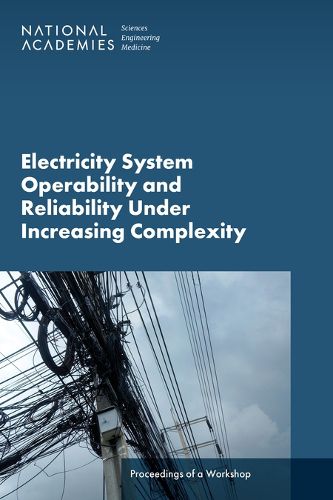Readings Newsletter
Become a Readings Member to make your shopping experience even easier.
Sign in or sign up for free!
You’re not far away from qualifying for FREE standard shipping within Australia
You’ve qualified for FREE standard shipping within Australia
The cart is loading…






The U.S. electricity system, known collectively as "the grid," is increasingly integrating a complex array of distributed energy resources (DERs) such as solar panels, wind turbines, batteries, and small-scale energy generators. By harnessing a diverse range of power sources and often generating energy close to the point of use rather than only in central power plants, DERs offer unprecedented flexibility in electricity generation and management. However, the imperative to maintain and improve the operational integrity of the grid as it takes on increasing quantities of DERs represents an emerging critical issue, particularly as demand for electricity enters a period of significant growth in many places across the United States.
To consider the research needs, operational standards, regulatory approaches, market incentives, and other facets relevant to ensuring the operational integrity of the grid as it integrates complex distributed elements, the National Academies of Sciences, Engineering, and Medicine convened a workshop on Electricity System Operability and Reliability under Increasing Complexity in Washington, DC, on June 17-18, 2024. The workshop convened representatives from government, industry, academia, and nongovernmental organizations to examine a variety of challenges that grid operators face in maintaining reliable and equitable electricity service, along with emerging technologies and capabilities that may impact grid operations and reliability.
Table of Contents
Front Matter 1 Introduction 2 What Keeps Grid Operators Up at Night? 3 Compensating Distributed Energy Resources: Markets, Equity, and Consumer Adoption Lenses 4 Breakout Discussions: Planning for Future Challenges 5 Regulating a Complex Electricity System with Increasing Distributed Energy Resources 6 Breakout Discussions: Opportunities for the Future Grid References Appendixes Appendix A: Workshop Agenda Appendix B: Biographical Information for Workshop Planning Committee Members
$9.00 standard shipping within Australia
FREE standard shipping within Australia for orders over $100.00
Express & International shipping calculated at checkout
The U.S. electricity system, known collectively as "the grid," is increasingly integrating a complex array of distributed energy resources (DERs) such as solar panels, wind turbines, batteries, and small-scale energy generators. By harnessing a diverse range of power sources and often generating energy close to the point of use rather than only in central power plants, DERs offer unprecedented flexibility in electricity generation and management. However, the imperative to maintain and improve the operational integrity of the grid as it takes on increasing quantities of DERs represents an emerging critical issue, particularly as demand for electricity enters a period of significant growth in many places across the United States.
To consider the research needs, operational standards, regulatory approaches, market incentives, and other facets relevant to ensuring the operational integrity of the grid as it integrates complex distributed elements, the National Academies of Sciences, Engineering, and Medicine convened a workshop on Electricity System Operability and Reliability under Increasing Complexity in Washington, DC, on June 17-18, 2024. The workshop convened representatives from government, industry, academia, and nongovernmental organizations to examine a variety of challenges that grid operators face in maintaining reliable and equitable electricity service, along with emerging technologies and capabilities that may impact grid operations and reliability.
Table of Contents
Front Matter 1 Introduction 2 What Keeps Grid Operators Up at Night? 3 Compensating Distributed Energy Resources: Markets, Equity, and Consumer Adoption Lenses 4 Breakout Discussions: Planning for Future Challenges 5 Regulating a Complex Electricity System with Increasing Distributed Energy Resources 6 Breakout Discussions: Opportunities for the Future Grid References Appendixes Appendix A: Workshop Agenda Appendix B: Biographical Information for Workshop Planning Committee Members